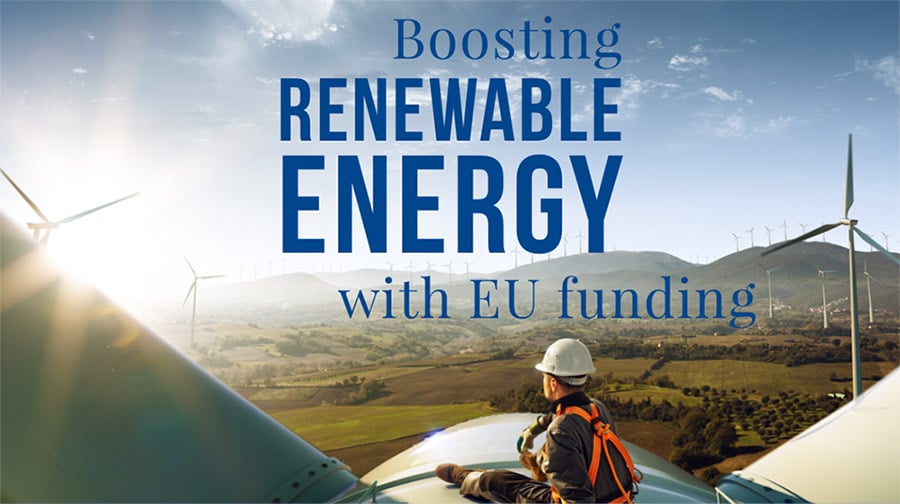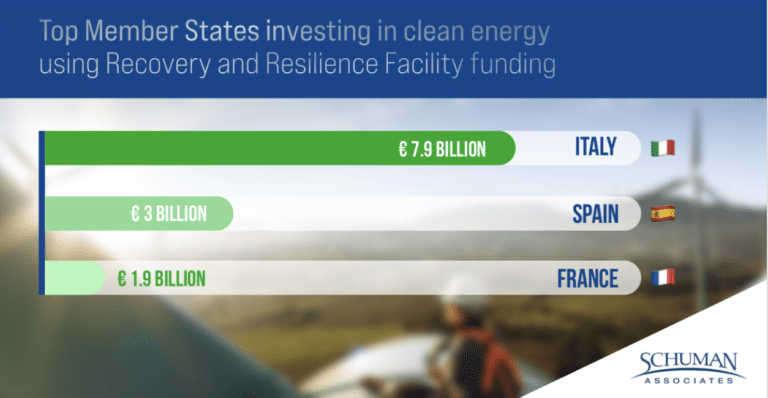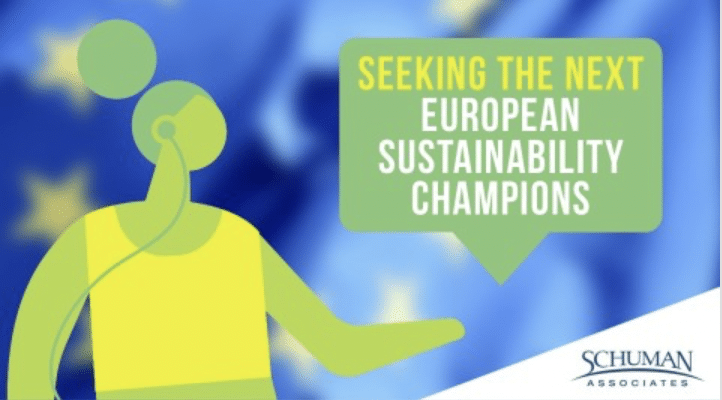Boosting Renewable Energy with EU funding
By Anca Wlizło, Senior Investment Consultant, Schuman Associates

In the past few years, Europe has faced several once-in-a-lifetime crises. Throughout the financial crisis of 2008, the global pandemic and the war in Ukraine, European countries have acted together for the common good. Fighting climate change has not always been the most visible crisis Europe was tackling, but nonetheless, tools and frameworks have been put in place to prevent and limit the harm done to our climate. This specific goal has become even more stringent in view of the need to rapidly reduce dependency on Russian fossil fuels.
The most recent target of becoming carbon-neutral by 2050 is coupled with the goal of increasing the share of clean energy in the gross final consumption to 45% by 2030. With the increased importance of security of supply and energy autonomy, Europe is bound to express even more ambitious goals.
The much-awaited RePowerEU Action Plan, released on 18 May, brings clarity on the actions the European Commission and Member States should take to boost independence from Russian energy suppliers and ensure preparedness in case of severe supply disruptions during this winter.
RePowerEU opens three lines of action to reach its goals:
Save energy – by incentivising citizens, public authorities and businesses to implement energy efficiency and saving measures at individual level, but also for buildings, industry and transport. A more ambitious target of 13% energy savings by 2030 is proposed, increasing from the current 9%.
Accelerate clean energy transition – by boosting support for renewable energy, especially solar PV, heat pumps, hydrogen and biomethane, but also by generally removing administrative red tape standing in the way of accelerated renewable energy investments. The Commission advanced the more ambitious target of 45% for renewables, an increase from the current Fit for 55 proposal of 40%.
Reduce dependency on Russian suppliers – by diversifying sourcing for gas, LNG and hydrogen, but also by ensuring that Member States gas reserves are filled in time for the heating season.
In this context, the European Commission estimates that annual investments in clean energy must double by 2030 if we are to reach the needed energy capacities. The private sector, financial institutions and governments must jointly act to finance the 600 GW of new solar capacities that should be in place by the end of the decade to reach our climate goals and support the process of limiting the dependency on Russia.
Deployment of more renewable energy production and storage capacity is coupled with support for boosting manufacturing of clean technologies for energy production. Europe is increasingly focusing on reshoring its solar PV and wind manufacturing value chain as a tool to prevent further energy supply disruptions.
Recovery and Resilience Facility and RePowerEU – Sustainable recovery and energy independence
To help achieve the renewed energy ambitions, Member States can make use of many instruments to support clean energy, such as:
-
- LIFE, Horizon Europe, Connecting Europe Facility or the Innovation Fund injecting funds into the most innovative clean technologies and critical European infrastructures. RePowerEU has already triggered dedicated calls for projects under all four programmes.
-
- Funding programmes set up at country level channeling EU or national funds such as the Cohesion Funds, the Recovery and Resilience Facility, the Just Transition Fund or the Modernisation Fund.
The Recovery and Resilience Facility (RRF) is one of the new instruments put in place to help Member States not only recover from the effects of the pandemic, but also build more sustainable, future-proof economies. With a current overall package of more than €700 billion, the Recovery and Resilience Facility must inject at least 37% of its funds in climate investments and reforms. The spending plans built by governments have already exceeded this target, allocating no less than €177 billion (39,9%) to support actions mitigating and preventing climate change.
Of this allocation, €18.1 billion will support clean energy generation using mature or innovative technologies with additional support for network development, interconnections and energy storage. Solar and wind technologies will receive the most support, but other technologies such as sustainable biomass and biomethane are also included. Various stakeholders can receive support, from energy communities to individual prosumers, public authorities and large energy companies.
In light of the recently released RePowerEU, the European Commission proposes an increase of the RRF budget by at least €20 billion coming from the EU ETS system to support additional investments and reforms aligned with the RePowerEUaction plan. Member States can add to these, funds from the Cohesion Policy or Common Agricultural Policy envelops, as well as allocate additional national funding to accelerate clean energy deployments.
In the coming months, Member States must decide which additional RePowerEU investments and reforms they will support, starting from recommendations made by the European Commission for each country. Keeping in mind the tight implementation schedules required by the Recovery and Resilience Facility, it seems the renewable energy sector will benefit from governments intense focus.
Top Member States investing To date, more than 61 measures have been put in place to support clean energy using Recovery and Resilience funding. Southern countries stand out as the largest investors in clean energy, with Italy investing almost €8 billion, Spain allocating €3 billion and France injecting almost €2 billion in solar, wind and other clean energy technologies.
To date, more than 61 measures have been put in place to support clean energy using Recovery and Resilience funding. Southern countries stand out as the largest investors in clean energy, with Italy investing almost €8 billion, Spain allocating €3 billion and France injecting almost €2 billion in solar, wind and other clean energy technologies.
Italy aims to obtain an additional 1,04 GW of clean energy from hybrid agriculture-energy productionsystems, directing €1.1 billion to support these projects, with investors getting now ready to submit their projects.
Clean energy production and storage systems located on the Canary or Balearic Islands will receive €700 million from the Spanish Recovery and Resilience Plan.
France will dedicate €400 million to support the construction of manufacturing facilities to produce equipment needed for clean energy such as solar panels or wind turbines. Several other countries amongst which Spain, Italy, Romania or Greece are following the lead, investing in reshoring clean energy technology manufacturing in Europe.
How can we help?
The EU’s climate goals are ambitious. Schuman Associates are proud to contribute to this journey by helping much needed green investments come to life.

